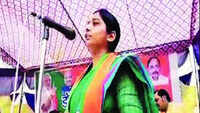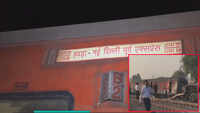Low urban voting: Dist SVEEP panel mulls survey
Jaideep Shenoy | TNN | Apr 22, 2019, 04:28 IST
Mangaluru: While most district election authorities would gladly settle for 77.9% voting in their respective Lok Sabha constituencies, Dakshina Kannada that has always prided itself for a relatively high voting turnout is not ready to rest on its past laurels. The district Systematic Voters’ Education and Electoral Participation (SVEEP) committee is mulling a study by social work students to probe the cause for relatively low voting in urban areas.
R Selvamani, chief executive officer, Dakshina Kannada zilla panchayat, who also heads the district SVEEP committee, told TOI that while the overall voting numbers in Dakshina Kannada is a cause for satisfaction, the district could certainly achieve more. The comparatively low voting in the two urban and urban-rural mix constituencies of Mangaluru City South and City North is a matter of concern and indicative of urban apathy of voters seen elsewhere, he says.
Keeping the past voting patterns in mind, the district SVEEP committee focussed most of its SVEEP activities to enthuse voters in these two constituencies – noticeable among them being a run, a human chain and a slew of literary activities that targeted the youth. The committee also specially focussed its attention on educational institutions that dot the city to get more youth and first-time voters to come out and vote.
There were a series of meetings with resident welfare associations and flat owners associations to drive home the message of importance of voting. Selvamani said after the election process, the SVEEP committee intends to engage social work students to go around households in these two constituencies with a questionnaire eliciting their views on why they choose to step out to vote or issues hampering them from doing so in this larger festival of democracy.
“The committee will also strive to drive home the point of online voter enrolment among the stakeholders, which is relatively a far easier process than doing so manually,” he said. “This (online registration) also empowers us senior officers to know the status of applications received and their disposal in terms of either inclusion, deletion, shifting or other processes involved, and makes the lower level staff involved with elections also accountable,” he added.
R Selvamani, chief executive officer, Dakshina Kannada zilla panchayat, who also heads the district SVEEP committee, told TOI that while the overall voting numbers in Dakshina Kannada is a cause for satisfaction, the district could certainly achieve more. The comparatively low voting in the two urban and urban-rural mix constituencies of Mangaluru City South and City North is a matter of concern and indicative of urban apathy of voters seen elsewhere, he says.
Keeping the past voting patterns in mind, the district SVEEP committee focussed most of its SVEEP activities to enthuse voters in these two constituencies – noticeable among them being a run, a human chain and a slew of literary activities that targeted the youth. The committee also specially focussed its attention on educational institutions that dot the city to get more youth and first-time voters to come out and vote.
There were a series of meetings with resident welfare associations and flat owners associations to drive home the message of importance of voting. Selvamani said after the election process, the SVEEP committee intends to engage social work students to go around households in these two constituencies with a questionnaire eliciting their views on why they choose to step out to vote or issues hampering them from doing so in this larger festival of democracy.
“The committee will also strive to drive home the point of online voter enrolment among the stakeholders, which is relatively a far easier process than doing so manually,” he said. “This (online registration) also empowers us senior officers to know the status of applications received and their disposal in terms of either inclusion, deletion, shifting or other processes involved, and makes the lower level staff involved with elections also accountable,” he added.
Making sense of 2019
#Electionswithtimes
View Full Coverage

































All Comments ()+^ Back to Top
Refrain from posting comments that are obscene, defamatory or inflammatory, and do not indulge in personal attacks, name calling or inciting hatred against any community. Help us delete comments that do not follow these guidelines by marking them offensive. Let's work together to keep the conversation civil.
HIDE